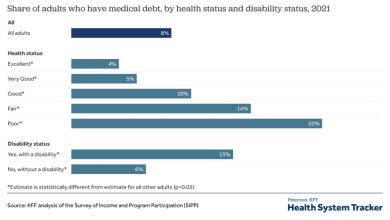The Pros and Cons of Texas Short Term Health Insurance
Approximately 19% of Texans under the age of 65 do not have health insurance. If you’re experiencing a coverage gap, you may want to consider short-term health insurance.
Make an informed decision about your healthcare coverage by understanding the pros and cons of Texas short-term health insurance.
Short-term health insurance in Texas has flexible coverage options and affordable premiums. This makes it a good option for those who need temporary coverage or have a gap in their current coverage.
Keep reading to learn more about the pros and cons of Texas short-term health insurance and how it compares to other insurance options.
What is Short-Term Health Insurance in Texas?
Short-term health insurance in Texas is a type of temporary medical coverage that is designed to fill coverage gaps. This can help individuals who are:
- Between jobs
- Waiting for employer-sponsored insurance to start
- Transitioning from one insurance plan to another
- Experiencing other coverage gaps
Short-term health insurance policies only last for a limited period, typically between 30 and 364 days. They can provide temporary coverage and flexibility for individuals who need it. However, it is not a replacement for traditional health insurance.
Short-term plans provide limited coverage and may exclude certain pre-existing conditions and preventive care. These plans are also not required to follow the same rules and regulations as traditional health insurance plans. So, they may not provide the same level of protection and benefits.
Pros of Short-Term Health Insurance in Texas
With flexible coverage options and affordable premiums, Texas short-term health insurance can provide the protection you need without breaking the bank. Learn more about the pros of Texas short-term health insurance and how it can benefit you and your family.
Coverage Gaps
Short-term health insurance can provide temporary medical coverage. It can help to fill insurance coverage gaps and provide peace of mind during transitional periods.
Flexibility
Short-term medical insurance plans are often more flexible than traditional health insurance. Individuals may be able to choose their own deductibles, co-payments, and coverage limits. This can be particularly appealing to those seeking greater control over their healthcare costs.
Lower Premiums
It is common for short-term health insurance policies to have lower premiums than traditional policies. In fact, a short-term policy is typically priced at 20% or less than the lowest-cost ACA-compliant plan in the same area. This can be an attractive option for individuals who are looking for more affordable coverage or who don’t need a full range of benefits.
No Open Enrollment Periods
The majority of short-term health insurance plans are available throughout the year, so individuals can enroll at any time. Individuals who miss open enrollment periods for traditional health insurance or who face sudden changes in circumstances may find this useful.
Customizable Plans
Many short-term health insurance plans allow individuals to customize their coverage. They may allow adding or removing certain benefits or adjusting deductibles and co-payments. This can be useful for individuals who want to tailor their coverage to meet their specific needs and budget.
No Network Restrictions
Short-term health insurance plans do not usually have network restrictions, so users can choose any provider they prefer. If you live in an area with limited providers or want to see a specific specialist, consider short-term insurance.
Cons of Short-Term Health Insurance in Texas
Short-term health plans usually don’t offer the same level of financial protection as traditional health insurance plans. They have higher deductibles and copays, and may not cover as many medical expenses. Here are some of the biggest cons that you should consider when looking for short-term health insurance policies.
No ACA Protections
The rules and regulations that govern traditional health insurance do not apply to short-term health insurance, including the protections provided by the Affordable Care Act (ACA). As a result, individuals may be more vulnerable to denial of coverage or rate increases with short-term health insurance.
Medical Underwriting
Some short-term health insurance policies require medical underwriting that traditional ACA policies don’t allow. In other words, individuals may have to undergo a medical exam or provide a health history to qualify. Those with pre-existing conditions or poor health can be denied coverage.
No Guaranteed Renewal
Typically, short-term health insurance plans are not renewable. So, when the coverage expires, individuals must find another plan. If a health condition makes you ineligible for coverage under the individual market, this may be a challenge.
No Coverage for Pre-Existing Conditions
Preexisting conditions are not covered in most short-term health policies. If you have a preexisting condition, you might have to pay a lot out of pocket.
Limited Benefits
Short-term health insurance policies typically provide limited benefits. They may not cover certain services such as preventive care, prescription drugs, or mental health treatment. This can leave certain individuals with significant out-of-pocket costs.
In addition, many temporary medical insurance plans have lifetime benefits limitations. This means that some services will no longer be covered after your bill reaches a fixed dollar amount. This can be difficult for individuals with chronic health conditions requiring frequent medical treatment.
For example, if you have a chronic condition such as diabetes or asthma, you may need to see a doctor regularly and take prescription medications. The costs of such treatments can be high, so if you have a short-term insurance plan with a lifetime benefit limit, you may reach that limit at some point and be responsible for paying for them yourself.
No Subsidies
Short-term health insurance plans don’t offer subsidies or cost-sharing reductions. So, individuals are responsible for paying the full premium and out-of-pocket costs. The cost of health insurance can be overwhelming for those who lack financial resources.
No Employer Contributions
Short-term health insurance plans don’t usually allow employer contributions. So, people who normally get employer contributions will have to pay the full premium themselves.
Short-Term Medical Insurance vs. ACA-Compliant Health Insurance
What are the differences between short-term health insurance and ACA-compliant coverage? Let’s break it down.
Differences in Benefits, Exclusions, and Protections
Short-term health insurance does not have to cover the same essential health benefits as ACA-compliant health insurance. As a result, it might not cover preventive care, maternity care, or mental health.
ACA-compliant health insurance doesn’t allow annual or lifetime limits on benefits like short-term plans do. Review the benefits and exclusions before enrolling in a short-term health insurance plan.
Impact on Individuals With Pre-existing Conditions
Pre-existing conditions are not covered by most short-term health insurance policies. In contrast, ACA-compliant health insurance plans must cover pre-existing conditions and can’t deny coverage or charge higher premiums based on an individual’s health status. Make sure you understand the exclusions of any short-term health insurance plan you’re considering to make sure it’s right for you, especially if you have a pre-existing condition.
What to Consider When Choosing Temporary Health Insurance
Here are some additional factors to consider when weighing your health insurance options in Texas.
Understanding the Limitations and Exclusions of the Plan
Check out the limitations and exclusions of any short-term health insurance plan you’re considering. Understand what’s covered and what’s not, as well as any annual or lifetime limits.
Some short-term health insurance plans may have limitations and exclusions that could impact your coverage. For example, they may exclude certain pre-existing conditions or preventive care services. They may also have annual or per-condition limits on benefits.
Evaluating the Premium, Deductibles, Co-payments, and Other Cost-Sharing Provisions
Take the time to compare premiums, deductibles, co-payments, and other cost-sharing provisions of any short-term health insurance plan you intend to purchase. This includes considering the potential out-of-pocket costs for medical treatment and whether you can afford these costs.
Reviewing the Network Provisions and Provider Options
Short-term health insurance plans often do not have provider networks, which means that individuals can see any provider they choose. This can be helpful for individuals who want to see a particular specialist or who live in an area with limited provider options. However, it is important to understand that you may face higher out-of-pocket costs if you see a provider who is not in your plan’s network. If you are considering a short-term health insurance policy, it is important to carefully review the network provisions to make sure it meets your needs.
Short-Term Health Insurance and Cost-Sharing
Short-term health insurance plans generally have higher deductibles and co-payments than traditional health insurance plans. This means that individuals may have to pay more out-of-pocket for medical treatment. Review the deductibles, co-payments, and other cost-sharing provisions to make sure the plan you choose meets your needs.
FAQs About Short-Term Health Insurance options in Texas
Do you have any questions? We’ve got answers. If you need more info or want a quote, call the team at Custom Health Plans, Inc. now!
Can I Get Short-Term Health Insurance Any Time of the Year in Texas?
Yes, short-term health insurance is generally available year-round in Texas, with no open enrollment periods.
Do Short-Term Health Insurance Plans in Texas Cover Pre-existing Conditions?
No, pre-existing conditions are generally not covered by short-term health insurance plans. Someone with pre-existing conditions may face significant out-of-pocket costs.
Are Short-Term Health Insurance Plans in Texas Required to Cover Essential Health Benefits?
No, short-term health insurance plans are not required to cover the same set of essential health benefits as ACA-compliant health insurance plans. They may exclude certain services such as preventive care, maternity care, and mental health treatment.
Can I Get Subsidies for Short-Term Health Insurance in Texas?
No, subsidies and cost-sharing reductions do not apply to short-term health insurance plans. If you have short-term health insurance, you may have to pay the full premium and out-of-pocket costs yourself.
Is Short-Term Medical Insurance Renewable in Texas?
No, short-term health insurance is generally not renewable. This means that individuals will need to find a new insurance plan when their short-term coverage expires.
Can I See Any Provider I Choose With a Short-Term Health Insurance Plan in Texas?
Yes, short-term health insurance plans generally do not have provider networks. This means that individuals can see any provider they choose. However, you may face higher out-of-pocket costs if you see a provider who is not in your plan’s network.
Can I Get Employer Contributions for Short-Term Health Insurance in Texas?
No, short-term health insurance is not eligible for employer contributions. This means that individuals who purchase short-term health insurance may have to pay the full premium themselves.
Can I Get a Short-Term Health Insurance Plan in Texas Longer Than 364 Days?
No, short-term health insurance plans in Texas are generally not available for periods of more than 364 days. If you need coverage for a longer period of time, you may want to consider a traditional health insurance plan or an ACA-compliant plan.
Get Health Insurance Coverage in Texas Today
If you need temporary coverage or want a flexible, affordable insurance plan, Texas short-term health insurance is a good option. However, remember to carefully consider the limitations and exclusions of short-term health insurance. It may not cover the same things as traditional health insurance.
Are you unsure about whether short-term health insurance is right for you? Do you need help finding health insurance that meets your needs and budget? Work with a licensed insurance broker in Texas at Custom Health Plans, Inc. Our team of experts can help you understand your options and find a plan that fits your needs.
Don’t let a coverage gap leave you vulnerable to unexpected medical costs – reach out to Custom Health Plans, Inc. today to learn more about your options and get a quote for temporary medical coverage.



